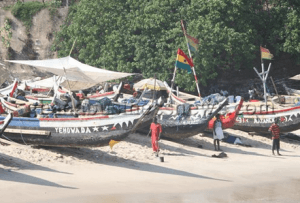Sustainable Ocean Project to empower 140,000 fishers in 292 landing beaches in Ghana
 Four Non-Governmental Organizations (NGOs) with focus on fisheries, have initiated a three-year programme dubbed: “Sustainable Ocean Project” to spur growth in the sector.
Four Non-Governmental Organizations (NGOs) with focus on fisheries, have initiated a three-year programme dubbed: “Sustainable Ocean Project” to spur growth in the sector.
The NGOs include the Environmental Justice Foundation (EJF), Hen Mpoano, Friends of the Nation, and Central and Western Fishmongers Improvement Association (CEWEFIA).
Supported by the Norwegian Agency for Development Cooperation (NORAD), the move strives to economically empower more than 140,000 fishers in 292 landing beaches in the Western, Central, Greater Accra, and Volta Regions.
Over the period, 5,000 artisanal fisherfolks will also be trained in fisheries management issues whilst 600 processors will be engaged in value addition, hygienic handling of fish, and access to credit.
The project is hinged on supporting a sustainable ocean economy in Ghana through inclusive, strong, and effective capacity, planning, and management of coastal ecosystems.
Aside from checking fishery declines, it would also enhance sustainability and secure fisherfolk access to sustainable fisheries resources through governance reforms to address over-capacity and illegal fishing and enhance participatory co-management.
It would improve the income resilience of fishing communities to climate and human-induced threats through enhanced opportunities for value addition along fisheries supply chains and enterprise development.
It will strengthen climate change adaptation and mitigation capacities in coastal areas through improved spatial and land use planning and community-led management of wetland and mangrove ecosystems.
Mr Osei-Akoto Nyantakyi, Programme Officer for EJF, giving an overview of the project at a fisheries stakeholder’s forum in Cape Coast, emphasized the contributions of small-scale fishers, processors, and traders in the fisheries value chain in Ghana.
Attended by various fisheries groups, Planners at the Assemblies, traditional leaders, and the media, the forum was to rake in stakeholders’ contributions.
As such, Mr Nyantakyi said the project would give stronger voice to women for influential decision-making, with more than 1,500 women directly benefiting from various training and capacity building.
Mr. Justice Camillus Mensah, the Project Manager with Hen Mpoano, also underscored the urgent need to safeguard the designated places for fishing activities along Ghana’s coastal stretch from encroachments and illegal acquisitions.
He decried the state of beachfront development affecting fishing activities and assured of plans to secure all landing beaches to serve their meaningful purpose, starting with ten beaches.
For that matter, he said the project would help to build the capacity of over 50 officials from the Navy, Marine Police, prosecutors, and judges with technical input from national legal experts to support effective enforcement of fisheries laws and good governance.
The project would build local and national constituencies to protect and rehabilitate mangroves which are resilience against climate change impacts.
“The project will target land use planners at the Metropolitan, Municipals, and District Assemblies (MMDAs) to incorporate mangrove protection into land-use plans; to build mangrove conservation into action plans including building the capacities of 160 traditional authorities, and landowners,” he noted.
For him, it was within the goals of the project to influence national policy implementation and enforcement of fisheries laws and regulations, noting that the project would raise awareness on sustainable fisheries issues.
For the media, he pledged that more than 30 journalists would be trained to ensure accurate, timely, and focused reporting.
Some participants also called for stronger collaboration among stakeholders for mutual gain.
Source: GNA
